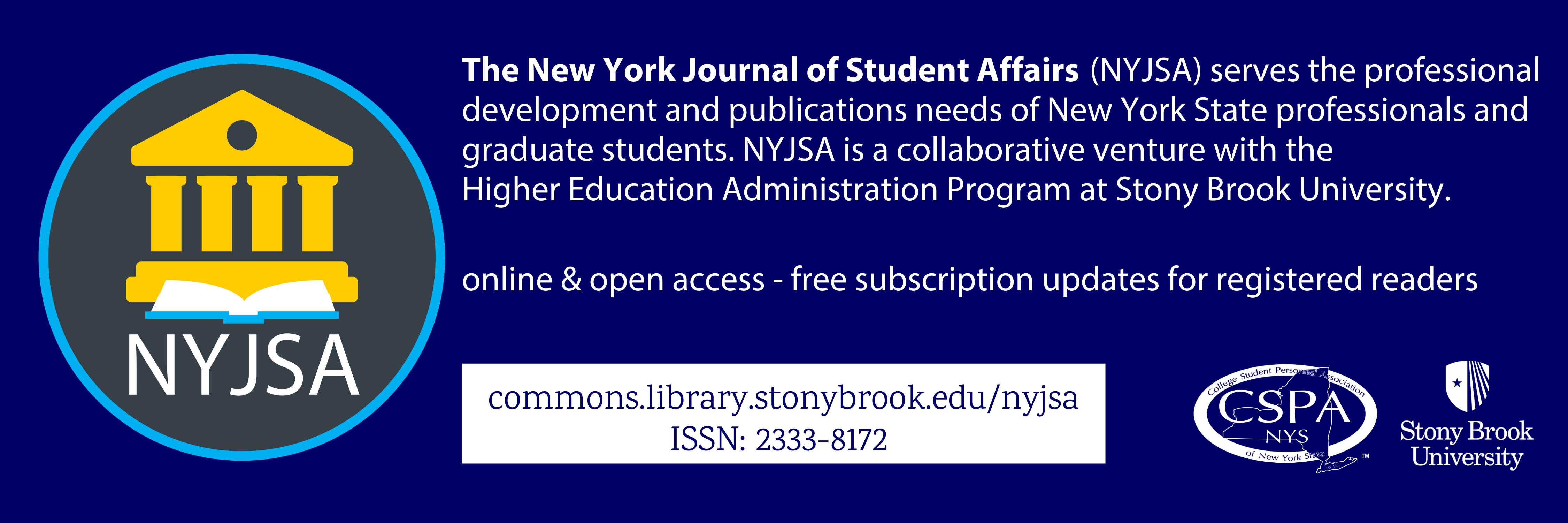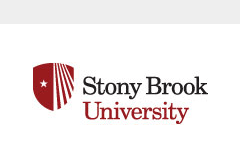New York Journal of Student Affairs

For Authors
The New York Journal of Student Affairs (NYJSA) accepts all forms of scholarship that address the practical application to contemporary student affairs practice.
The journal has maintained a consistent mission of being a place for both scholars and practitioners to publish new ideas and best practices that inform the fields of student affairs and higher education. We seek reviewers from a variety of backgrounds who can bring diverse perspectives and expertise to the review process.
To that end, NYJSA has a developmental philosophy and has strived to engage experienced and new authors in the peer reviewed publishing process, to affirm their work, provide constructive feedback, and worked to move their piece to publication, often becoming a place for first time publications. We believe in this mission and believe that there should be a journal that is accessible for all.
Author Audience
Established Faculty and Professionals – The journal invites established authors for individual work or in conjunction with their student research teams to submit original research or literature reviews on contemporary topics to inform professional practice.
New Faculty - This journal particularly supports new faculty members as they begin their publishing careers, offering extensive feedback and coaching to support successful publishing their manuscripts.
Graduate Students and New Professionals – Manuscripts that feature the work of current doctoral students and/or recent graduates/new professionals (1-3 years post masters or doctoral work).
Content Invited
NYJSA invites all forms of scholarship recognized in the 7th edition of the Publication Manual of the American Psychological Association including original empirical research, literature reviews, theoretical articles, methodological articles, and case studies. Thoughtful essays and historical overviews are accepted. The journal encourages:
Empirical Research – Manuscripts that report the results of empirical research related useful the student affairs practice and practitioners. Qualitative and quantitative methods are accepted.
Research to Improve Practice – Manuscripts that describe new programs, practices, or initiatives, are supported through literature, provide evaluative information, and provide considerations for campus adaptability and implementation.
Literature Reviews – Manuscripts that synthesizes historical and/or emerging literature on topics critical to student affairs and higher education.
Media Reviews – Manuscripts that summarize and analyze all forms of publication open to and useful for student affairs practitioners, including books, reports, video, and other forms of electronic content.
Essays and Historical Overviews – Manuscripts that reflect on specific research or theories; offer thoughtful opinions on topics of current interest and/or importance; respond to historical concerns, on-going debates, or essays or articles in this or other scholarly journals; or offer thoughtful reflection on the state of student affairs, higher education, or the profession.
Invited Pieces – The NYJSA Editor may solicit invited manuscripts from leaders in the field and on topics important to student affairs for publication in the journal.
Submission and Publication Schedule
Submissions for the Journal – Submissions are accepted continuously (no fixed submission deadlines).
Publishing Schedule – The NYJSA publishing year is January 1 – December 31. The online format allows for continuous publishing within the publishing year. Accepted manuscripts will be published online upon completion of the full review process for acceptance.
Submissions may be submitted via the Submit Article link.
General Guidelines for All Manuscripts
All manuscripts submitted the NYJSA should:
- Be prepared according to the 7th edition of the Publication Manual of the American Psychological Association.
- Use appropriate inclusive language, following guidelines in the APA 7th edition.
- Use APA 7th verb usage guidelines. Use past tense for the literature review and methodology. Use present tense for the findings and the discussion. Use active voice as much as possible. Academic writing is clear and concise, not complex, or convoluted.
- Be submitted in Microsoft Word document file format.
- Manuscripts is a maximum of 3500-7000 words in length unless an exception has been granted by the journal editors.
- Be double spaced in all aspects of the manuscript, including references, tables, figures, and quotations.
- Use Times New Roman 12-point font.
- Use uniform one-inch margins.
- Employ italics where appropriate in APA format, rather than underlining (except with URL addresses)
- Place all illustrations, figures, and tables within the text at the appropriate points, rather than at the end.
- Should include doi information for reference citations whenever available, or URLs for the references if a doi alternative is not possible.
- Include an abstract of 100 words.
- Include a robust Keywords listing.
- Use running heads and number all pages beginning with the title page.
- Not use footnotes; include all sources and information within the text consistent with APA 7th philosophy.
- Begin the reference list on a new page.
Copyright Notice
In consideration for publication of the article, the author(s) assign the Academic commons all copyright in the article, subject to the expansive personal-use exceptions described in the full copyright descriptions at this link
Privacy Statement
The names and email addresses entered in this journal site will be used exclusively for the stated purposes of this journal and will not be made available for any other purpose or to any other party.
